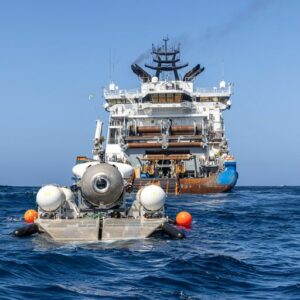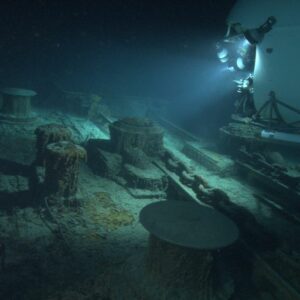
Consultant, attorney for Bezos, Cameron turns personal adventures into scalable learning opportunities
By Eric Valentine

For a deep sea explorer with a hand in space travel, Dave Concannon’s circle here is small. Spend two hours interviewing him though and you begin to understand it’s not due to introversion. Rather, it’s because the attorney and advisor for the likes of Jeff Bezos and James Cameron has a lot of small circles, all across the globe and filled with influencers who have impacted the world’s history from under its oceans to above its skies.
The exclusivity is not born out of arrogance—although Concannon’s confidence is crystal clear. Nor is it a matter of entitlement—although the Philadelphia native and child of a single-parent seems to know when he doesn’t have to take no for an answer. The exclusivity—perhaps more aptly described as deliberateness—stems at least in part from a seminal moment in his youth when the teenager, who was in awe of all people and things that had been in outer space, attended a school assembly for an Apollo astronaut who Concannon preferred not to name. (Let’s just say it was not the first man to walk on the moon, it was the …).

In the remarkably accomplished astronaut’s keynote address, which—to put in fair context—followed the then-recent defunding of the Apollo missions, the moonwalker told the student body that mankind’s Golden Age of exploration was dead and that they could pack up their dreams of becoming the first person to set foot on Mars or anything else as astronomically important or cool.
“That didn’t sit well with me,” Concannon recalled.
By the time Concannon was on the high seas and in deep seas peering through the porthole of the RMS Titanic while working for James Cameron, the producer-director-writer of the movie Titanic, Concannon had a more PG-rated level of thought running through his head.
“I thought to myself, ‘(Expletive) you, Astronaut (Blank). (Expletive) you,’” Concannon recounted the experience half grinning.
Doubling Down
Concannon has much to smile about when it comes to his career. For roughly five years, beginning in 2010, the north Valley resident led Amazon founder Jeff Bezos’ recovery of the F-1 engines from the Apollo 11 Saturn V rockets that launched humans headed for the Moon. That mission was successful and carried out safely. It’s part of an exploration resumé that includes a cluster of major accomplishments—like recovering treasure from the world’s deepest shipwreck. And it has run in conjunction with Concannon’s law practice that hasn’t seen him lose a trial in more than a quarter century.
“I don’t like to do things that are expected. That’s why I haven’t lost a trial in 27 years. Most people do exactly what they always do,” Concannon said.
Concannon has a habit of mitigating any bravado with self-deprecating anecdotes like the one inspired by his son who welcomed his dad home from the Apollo venture by saying, “Congratulations Dad, you finally did something that matters.”
“When I recovered enough to ask him to explain, he said ‘You are finally associated with a triumph instead of a tragedy,’” Concannon said.
Concannon’s first major accomplishment in all things explorative—or at least dazzlingly daring—was his successful climb to the top of Mount Kilimanjaro, the highest free-standing mountain above sea level in the world at more than 19,000 feet in 1989. It may also play a role in how Concannon always seems to reel back any hint of arrogance and in lockstep place it firmly in the realm of humility.
“I got whacked,” he said of the Kilimanjaro climb. “I ran up that mountain, and it nearly killed me. It dramatically altered my way of life.”
The brash handling of that adventure killed his climbing career and for years had left him reeling and recovering from memory issues, vision problems, and even a stammer.
“So, I just doubled down,” Concannon said, deliberately of course. And he soon found himself one of the youngest members ever of The Explorers Club and one of the only members who also practiced law.
He also practiced listening to good advice, such as some that came from Buzz Aldrin (yes, that Buzz Aldrin, who made three moonwalks, and for the record was neither the first nor last man on the moon). The astronaut told Concannon he should really get into space law.
“OK, Buzz Aldrin, I’m listening,” said Concannon. “And then he told me there really wasn’t any space law and there needed to be.”
With his skill set and experience, requests to serve on boards and to serve as general counsel for major organizations and individual players in the world of exploration have followed Concannon across his career. The Valley resident spearheaded the search that helped Amazon’s Jeff Bezos recover the F-1 engines from the Apollo 11 Saturn V rockets—the ones that launched humans headed for the Moon—and also helped the world’s richest man (second richest sometimes) in the early development of the commercial space industry.
Yes, that commercial space industry. As you witness world governments and mega-billionaires shoot toward Mars and the Moon, you can safely assume Concannon had a hand in that part of human history, or at least knew exactly what each player was going to do.
A Figurehead
As deliberate and clear as Concannon’s character can be, truly understanding what motivates a personality like him can be more like a deep-sea dive or K2 climb than a walk on the beach or in the park. Concannon says he doesn’t talk about it a lot, but knows his father’s absence for the first decade of his life and his childhood spent in poverty are two factors contributing to all that makes him tick. But more critical to his development than that was the time he had spent growing up under the tutelage of his Ocean City, New Jersey-based grandfather George Murphy.
“He left school in eighth-grade to start a successful plumbing business. He loved planes, but was afraid to fly. He’d take me to the airport and tell me the names of planes,” Concannon said. “He lived from almost the time of the Wright Brothers, and definitely from when Lindbergh crossed the Atlantic, to the landing on the moon. And he thought that was fantastic.”
Grandpa Murphy was the first to trigger Concannon’s exploratory imagination during that time. He would point to the tiller post from a shipwreck that happened a century ago off the coast of Ocean City and talk to his grandson about it.
“Can you imagine the interesting stories that ship could probably tell?” he’d ask his grandson.
The experience set a template for Concannon’s imagination: One man’s shipwreck is another man’s figurehead, leading them into uncharted things that should probably be seen.
On July 7, Concannon will be starting his fifth expedition to explore the wreck of the RMS Titanic. More importantly, he’ll be hosting a worldwide event live for Varsity Tutors on what it takes to be part of a major expedition to the Titanic. The program is free, geared to students and families, and anyone can access it with the link: tinyurl.com/titanic-murphy
It’s very similar to a presentation Concannon has already done once for The Discovery Center of Idaho, which made it to 12,000 computer screens. Concannon would love to see it expand and be used in school districts to teach across disciplines since the Titanic story is one of history, sociology, geography, exploration and multiple scientific disciplines. At the very least, it’s a better lesson to learn than the death of exploration soundbite a justifiably upset astronaut tried to get across to a group of kids decades ago. And while it might not create the next Vasco da Gama, it will set the stage for understanding how we are all sunken ships, at some point in time at least. And so we get to choose from the wreckage all which we want to recover and record and let the world into our circle to see.
